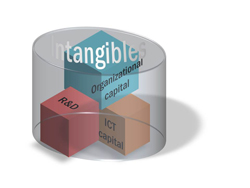Intangible capital to drive growth
Investing in intangibles such as knowledge, research, development, education, innovation and information technology is very important for driving smart growth across Europe. The EU-funded project 'Intangible capital and innovations: Drivers of growth and location in the EU' (INNODRIVE) investigated the capacity of intangible capital to generate growth at corporate and national levels. It defined intangibles to include innovative property, scientific and non-scientific research and development (R&D), licences or patents, software, spending on reputation (advertising), firm-specific training and organisational capital. the study led to an important set of findings related to the impact of intangibles on the economy. To illustrate, the project team found that gross domestic product (GDP) in the EU was 5.5 % higher after including all intangible investments. This meant that ignoring intangibles in national accounts implied an underestimation of GDP by 5.5 %, as well as an underestimation of labour productivity growth by 10–20 %. in addition, the project team developed new data on intangibles at the company level using expenditure and performance-based estimates of intangible capital. This has yielded a much clearer picture of intangible assets, narrowing the notable gap between market values and book values of assets. The project shows that company-level organisational capital produced by management and marketing usually exceeds company’s own R&D effort. noting that innovation is much more than R&D, the project emphasised how investment in intangibles such as a firm's competencies including organisational investment reflect a more accurate measure of innovation intensity. In this sense, a key message emerging from the project is that the diversity of intangible capital should be emphasised so that policies do not promote R&D investment alone. the project team then looked at intangibles in specific EU countries including Belgium, Czech Republic, Germany, France, Hungary, Netherlands, Finland, Sweden and the United Kingdom. It also studied Portugal, Italy, Greece and Spain (PIGS), whose investment policies notably rely more on tangible than on intangible investments. These countries have suffered more in relative terms from the transition of production to beyond Europe's borders, especially Asia. Acknowledging this phenomenon revealed insightful trends that could further enhance policymaking. INNODRIVE also studied how new intangible shares of GDP vary considerably across European countries as well as the implications behind these differences. Other important findings included the average impact of capitalising intangibles on GDP, structures of intangibles across countries, and how accumulation of intangible capital promotes labour productivity and well-being. This knowledge will ultimately contribute to better policies on intangibles, both on a national level and on a corporate level, advancing the prospect of a robust knowledge economy for driving growth.







